
3
1 15V/7A range selection key Selects the 15V/7A range and allows the full rated output
to 15V7A.
2 30V/4A range selection key Selects the 30V/4A range and allows the full rated output
to 30V/4A.
3 Overvoltage protection key Enables or disables the overvoltage protection function,
sets trip voltage level, and clears the overvoltage condition.
4 Overcurrent protection key Enables or disables the overcurrent protection function,
sets trip current level, and clears the overcurrent condition.
5 Display limit key Shows voltage and current limit values on the display and allows
knob adjustment for setting limit values.
6 Recall operating state key Recalls a previously stored operating state from location
"1", "2", or "3".
7 Store operating state / Local key
1
Stores an operating state in location "1", "2", or
"3" / or returns the power supply to local mode from remote interface mode.
8 Error / Calibrate key
2
Displays error codes generated during operations, self-test
and calibration / or enables calibration mode (the power supply must be unsecured
before performing calibration).
9 I/O Configuration / Secure key
3
Configures the power supply for remote interfaces
/ or secure or unsecure the power supply for calibration.
10 Output On/Off key Enables or disables the power supply outputs. This key toggles
between on and off.
11 Control knob Increases or decreases the value of the blinking digit by turning
clockwise or counter clockwise.
12 Resolution selection keys Move the blinking digit to the right or left.
13 Voltage/current adjust selection key Selects the knob control function for voltage
or current adjustment.
1
The key can be used as the "Local" key when the power supply is in the remote
interface mode.
2
You can enable the "calibration mode" by holding down this key when you turn on
the power supply.
3
You can use it as the "Secure" or "Unsecure" key when the power supply is in the
calibration mode.





















